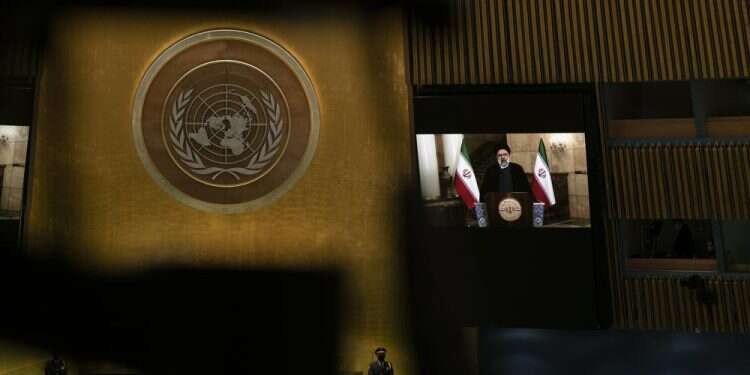Iran's new president slammed US sanctions imposed on his nation as a mechanism of war, using his first UN address since his swearing-in to forcefully call out Washington's policies in the region and the growing political schism within America.
Follow Israel Hayom on Facebook and Twitter
President Ebrahim Raisi on Tuesday delivered a far more critical and blunt take on American foreign policy than his moderate predecessor, Hassan Rouhani, had done in previous speeches to the UN General Assembly.
His speech espoused Iran's Islamic political identity and where the Shiite-led nation sees its place in the world, despite crushing US sanctions that have hurt its economy and ordinary Iranians.
"Sanctions are the US' new way of war with the nations of the world," Raisi said, adding that such economic punishment during the time of the COVID-19 pandemic amounts to "crimes against humanity."
In taking aim at the United States, Raisi also referenced the shocking Jan. 6 insurrection on Capitol Hill by supporters of then-President Donald Trump, and the horrific scenes at Kabul airport last month as desperate Afghans plunged to their deaths after clinging to a US aircraft evacuating people.
"From the Capitol to Kabul, one clear message was sent to the world: the US' hegemonic system has no credibility, whether inside or outside the country," Raisi said.
The Iranian president said "the project of imposing Westernized identity" had failed, and added erroneously that "today, the US does not get to exit Iraq and Afghanistan but is expelled."
The US military withdrew from Afghanistan amid a hasty and chaotic airlift of more than 100,000 Afghans and foreigners and has largely withdrawn from Iraq. Iran shares long borders with Afghanistan to its east and Iraq to its west, where Shiite militias are powerful.
The perseverance of nations, he said, is stronger than the power of superpowers. In a dig at the political slogans used by Trump and his successor President Joe Biden, Raisi said, "Today, the world doesn't care about 'America First' or 'America is Back.'"
Speaking remotely via video from Tehran, Raisi wore a black turban on his head that identifies him in the Shiite tradition as a direct descendant of the Prophet Muhammad. He praised Iran's Islamic Revolution of 1979 as the fulfillment of "religious democracy" and linked the growth of "indigenous terrorism in the West" to a decline in spirituality.
The Israeli Foreign Ministry slammed the addresses, saying in a statement, "The Iranian regime is a clear and immediate danger to the Middle East and world peace. The new government in Iran, headed by Raisi and most of its ministers, are the extremist face of a regime that has harmed Iranian citizens for more than 40 years, encouraging and financing terrorism and destabilizing the entire region.
"Raisi continues to fool the international community with a speech full of lies and cynicism. The international community must condemn the Iranian regime and prevent in any way the possibility that weapons and nuclear capability will fall into the hands of these extremists."
Despite the criticism aimed at Washington, Raisi appeared not to rule out a return to the negotiating table for the nuclear accord, saying Iran considers talks useful if their ultimate outcome is the lifting of all sanctions. Still, he stated: "We don't trust the promises made by the US government."
Iran said on Tuesday that talks with world powers over reviving its 2015 nuclear deal would resume in a few weeks, the official Iranian news agency IRNA reported.
"Every meeting requires prior coordination and the preparation of an agenda. As previously emphasized, the Vienna talks will resume soon and over the next few weeks," Iranian Foreign Ministry spokesman Saeed Khatibzadeh said, according to IRNA.
A senior US State Department official said Washington had taken note of Raisi's speech but was looking to Iran for actions, rather than rhetoric.
In that context, the official said the US also noted an Iranian foreign ministry statement earlier Tuesday that said Iran is willing to return to the indirect nuclear talks in Vienna in the coming weeks.
"We continue to believe that we need to re-engage in the Vienna context as soon as possible," said the official, who was not authorized to publicly discuss the matter and spoke to reporters on condition of anonymity.
Raisi, an ultraconservative cleric and former judiciary chief dubbed the "Butcher of Tehran" over his involvement in mass executions of dissidents in the 1980s, was sworn in last month after an election seen mostly as a sham, as he is close to Iran's Supreme Leader Ayatollah Ali Khamenei.
Meanwhile, over 400 Iranian-American scholars urged the US President Joe Biden, ahead of his speech to the UN General Assembly, to call for Raisi to stand trial before an international tribunal for his role in the 1988 execution of dissidents.
According to Fox News, the Organization of Iranian-American Communities issues a similar call to Biden.
On Tuesday, dozens of Iranian dissidents protested outside the UN General Assembly in New York City to urge the body and the international community to act against Raisi decrying his "crimes against humanity" and "massive human rights abuses."
Subscribe to Israel Hayom's daily newsletter and never miss our top stories!




